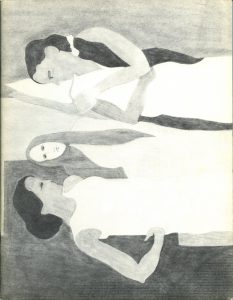you knew what it was three miles off
tearing through the curves of old 623
straightening them out like curly string
hardly a foot of the whole six miles the road ran
hadn’t tasted the smoking rubber it peeled
and left like pairs of long black snakes
stretching from curve to killer-hanging curve
WORD WAS the kid who’d hopped it up
could pop the clutch on that thing
and the front end would leap into the air
like a startled stallion
there wasn’t a badge in the county
who wouldn’t’ve given a year’s pay
to be driving something with horses enough
to burn that streak of blue lightning
into the ground
the same way a ten-speed would lose a tricycle
he’d lost every bubble gum machine around
–17
and already a country people’s legend
exciting even their dreams
the way he handled that thing:
you would’ve sworn
that birth had brought him in with the wheel in his hands
the year was ‘66
i left home
to prove whatever it was
young country men
head out to prove
and stayed away five years
he was going to be another richard petty
when i returned
i asked a buddy what tracks he’d been burning down
and if the ‘55 chevy still streaked 623
“raymond speed” the buddy said
“raymond speed got his head snapped off
in a hopped-up pickup truck
in that curve down pass your mother’s house
… and his pretty little wife too”
George Mosby, Jr.’s work appeared in phoebe multiple times in the 70s, 80s, and 90s. Unfortunately, little biographical information on George is found in these issues. From our 1979, 8.2 issue, we see that in addition to phoebe his work appeared in Images, Hanging Loose, The Unicorn, Northwoods Journal, and Vega. In 1978, he won 3rd place in the Wayside Quarterly Poetry Award.
In 1990, phoebe reached out to Mosby’s wife, Judith Ann Mosby. Her response to this request was published in our 20.1&2 issue from 1990. Among other details, she wrote that Mosby was born in 1950. At the age of three, his father, a Korean War veteran, was found hanged in an apple tree in their yard. It is not known whether it was a murder or suicide.
Mosby grew up in poverty, and spent time in the James River Correctional Center where he married Judith Ann in 1982. The following year, upon his parole, they had a daughter.
She closes the letter with this:
“George rests in the backyard of his grandparents, beside his grandmother’s grave. He died of what the medical examiner called an accidental overdose of diphenhydramine, a cough syrup. He was alone at the time of his death and his family is left with doubts as to whether it was an accident, a suicide or a murder.”
Earlier in the letter Judith Ann wrote that, “The poems will have to speak for themselves. I believe there is an underlying concern in George’s work to return to a more peaceful time than the one that surrounded him as an adult.”
